Women and Technology for Peace
An initiative will always be successful when it has the support and decisive action of women. If spiritually enlightened by the purpose of improving the living conditions of citizens, starting with the fair and fraternal relationship between them, nothing is impossible to women.
Confident about this fact, I greet the Heads of State and government and the representatives of international agencies, the private sector, and civil society organizations attending the 62nd session of the Commission on the Status of Women (CSW), which the United Nations (UN) is holding in 2018. It is important to give the deserved attention to the event’s review theme, “Participation in and access of women to the media, and information and communications technologies and their impact on and use as an instrument for the advancement and empowerment of women.”
All those participating in this relevant conference will be able to learn through the pages of this magazine a little about the indispensable alliance that exists between female leadership and the use of technology in the social, educational, and communication work of the Legion of Good Will (LGW). These are daily and dynamic practices, which help reduce the negative impact caused by social inequality. This unfortunate scenario exhausts the energy and efforts of the inhabitants of any country.

Therefore, my appreciation to all those who offer their essential contribution to this conference, which, in addition to defending women’s rights, values their actions in facing up to the huge contemporary challenges.
A Platform of Peace for the World
It is always an opportune moment to point out that the search for world Peace and the effective enforcement of human rights represents a major undertaking, which should remain a priority in our endeavours, including the use of technology for raising awareness to the fact that acts of war are of no benefit to any nation. The history of Humanity is filled with such tragic examples. It is common ground that there are no winners in war. It results in severe spiritual, emotional, psychological, and material damage; in short, immeasurable suffering and cruel losses, in which the first victims are women and children. In addition to this, we cannot close our eyes to the horrendous cases of rape that still plague society—whether in conflict zones or not—to brutal ethnic cleansing, the heinous crimes of racism and slave labor, and other countless atrocities.


Chimamanda Ngozi Adichie
To prevent so much misfortune, we cannot give up encouraging the good side that everyone has and deeply believing “in the ability of human beings to remake themselves for the better,” as the remarkable Nigerian writer Chimamanda Ngozi Adichie recommends.
Atoms Of Concord

Richard Feynman
The 1965 Nobel Prize winner in Physics, the North American Professor Richard Feynman (1918-1988) once asked:
“If, in some cataclysm, all of scientific knowledge were to be destroyed, and only one sentence passed on to the next generations of creatures, what statement would contain the most information in the fewest words?”
He himself came up with an answer:
“I believe it is the atomic hypothesis (or the atomic fact, or whatever you wish to call it) that all things are made of atoms—little particles that move around in perpetual motion, attracting each other when they are a little distance apart, but repelling upon being squeezed into one another. In that one sentence, you will see, there is an enormous amount of information about the world, if just a little imagination and thinking are applied.”
The atom really does carry within itself a great amount of data and much progress to this planet. However, my dear Feynman— who is still alive, because the dead do not die—for this hitherto vile world there is a word that adds even more information about the Universes and establishes a permanent harmony in their existence so they do not seek their own destruction: Love.
Look at the irony: today we are witnessing the misuse of the knowledge about the atom, in other words, a knowledge without Fraternal Love, which can lead us precisely to an unprecedented nuclear cataclysm. This disharmony of a soulless knowledge was evidenced by the magazine A Recreativa, from Poços de Caldas, Brazil, which presented the following note in October 1987:
“Encyclopedias ― An English newspaper observed that in the first edition of a wellknown encyclopedia published in 1768 the word ‘atom’ was explained in four lines, whereas five whole pages were dedicated to the word ‘Love.’ In the latest edition of the same encyclopedia, the definition of ‘atom’ has five pages, and the word ‘Love’ is not even mentioned.”
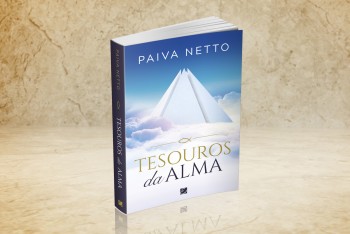
Treasures of the Soul
This reveals a great deal about the directions of human knowledge and the technologies that derive from it and about the imbalances that exist in different sectors of society. How about illuminating the important material knowledge with the divine lights of Fraternal Love—a safe path to lead Humanity through the difficult times it has been creating for itself? While some seek to extract their warlike impact from the atom, I recommend we reflect on the page I published in my book Tesouros da Alma [Treasures of the Soul] (2017) entitled “Atoms of Concord.” In it I argue that loving with a pure Soul is a Law and if we know how to live by it with dignity, we shall rise up, renewing everything around us. This is similar to an explosion of atoms of concord, an enlightenment that will occur step by step as we mature. That is why to educate with Ecumenical Spirituality is to transform—and let it naturally be for the better. If the human being is transformed, the planet will be restored. However, we know very well that such success does not happen overnight. A few millennia are insignificant in historical spiritual calculations. The maturing of minds requires effort, patience . . . If those who preceded us did not believe in the certainty of a victory on the road ahead, where would we be now? Hope never dies! It is fundamental. Our Hope, which we suggest to hearts of Goodwill, is the Ecumenical Jesus, who offers us this message of Peace:
“A New Commandment I give you: love one another, as I have loved you. . . . There is no greater Love than to lay down one’s life for one’s friends.” (The Gospel according to John’s notes, 13:34 and 15:13)
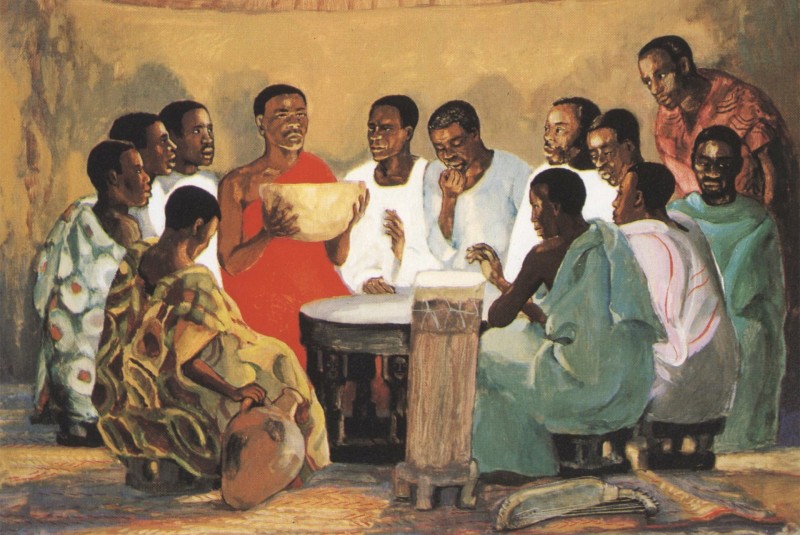
The Last Supper, scene from the “Life of Jesus Mafa” collection, executed by Bénédite de la Roncière in Cameroon in the 1970s, inspired by the Gospel of Christ according to John, chapters 13 to 17
From Him we can learn that Universal Love is not an unachievable dream.
The Internet, Education, and Power
In my column for the Jornal de Brasília newspaper, from the federal capital of Brazil, published on March 3, 2015, I wrote that it is not surprising that the Internet has become an indispensable tool in our daily routine. When we access it, boundaries that were previously insurmountable for the majority of the population come down. However, I have warned that Education is power, and the same can be said with regard to the appropriate use of the cyberspace. Without proper teaching, allied with the values of Ecumenical Spirituality, the handling of this influential resource can be disastrous. For this reason, we urgently need to intensify our effective guidance, since childhood, so that this extraordinary progress does not turn against the users themselves and that it does not result, consequently, to the detriment of the whole community.
Science, Technology, and Women’s Activism
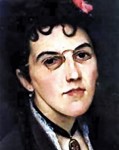
Anália Franco
The distinguished Brazilian educator, journalist, poet, and philanthropist Anália Franco (1853-1919), a strong defender of women and girls’ right to education, stated:
“Society needs to recover with advantage the benefit that Humanity has lost. We have a lot of faith in the efforts of the human mind for the education of young people, the only means for future regeneration. It is not only by polishing the intelligence that generations will be reformed; feelings need to be penetrated and the hearts fortified.”
In fact, Anália Franco broke down barriers by using her associative spirit to provide shelter, education, and access to decent work for those who were down on their luck. She set up an important protection network for women and orphans. In women’s defense, she led along with O Álbum das Meninas [The Girls’ Album]—a literary and educational magazine that she launched on April 30, 1898—the spreading of ideas of freedom and gender equality, of women’s participation in basic education and professional education programs, their effective presence in the labor market, their prominent role as guardians and managers of the education of the new generations, and the concept of women’s empowerment for the necessary changes in the society of her time.
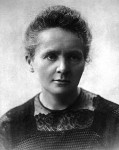
Madame Marie Curie
Madame Marie Curie (1867-1934), the notable Polish scientist—the first woman to be awarded a Nobel Prize and the only person to win it in different scientific fields (Nobel Prize in Physics 1903 and in Chemistry 1911)—was recognized not only for her efforts and countless sacrifices in favor of scientific progress, through the pioneering research into radioactivity that cost her own life. At the time of her death, The New York Times called her a “martyr to Science” who “contributed more to the general welfare of Mankind.” The 1923 Nobel Prize winner in Physics, Robert Millikan (1868-1953), then President of the California Institute of Technology (Caltech), issued a public statement,
“In spite of her continuous absorption in her scientific work, she has devoted much time to the cause of Peace.”
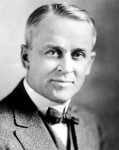
Robert Millikan
From the height of her perseverance and humanitarian spirit, this brilliant woman—from whose breakthroughs resulted significant technologies for the field of Medicine—concluded:
“You cannot hope to build a better world without improving the individuals. To that end each of us must work for his own improvement, and at the same time share a general responsibility for all Humanity.” [Emphasis added]
Silencing the Sinister Voices of Weapons

Reflexões da Alma (2003) – Lançado também em Portugal, pela Editora Pergaminho, em 2008, e em Esperanto, em 2011, e em Espanhol, pela Editora Dunken. Adquira!
With the educational power of women and mothers, let us use the technological resources available and those that are yet to be created by human audacity to persevere working on the path to Peace and Justice.
In my book Reflexões da Alma [Reflections of the Soul] (2003), I stated that if we continue fighting for the Good, there will come a day when weapons will finally have their sinister voices silenced. In this millennium, which I consider to be the millennium of women—even though it may take time—human beings will understand that the essence of power does not selfishly lie in them, but in the spirit of Solidarity, which must unite all. There is still a lot to be done. Future generations expect bolder attitudes from all of us. If this is a difficult undertaking, let us begin yesterday!
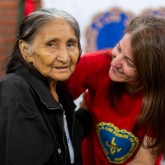
The comments do not represent the views of this site and are the sole responsibility of their authors. It denied the inclusion of inappropriate materials that violate the moral, good customs, and/or the rights of others. Learn more at Frequently asked questions.